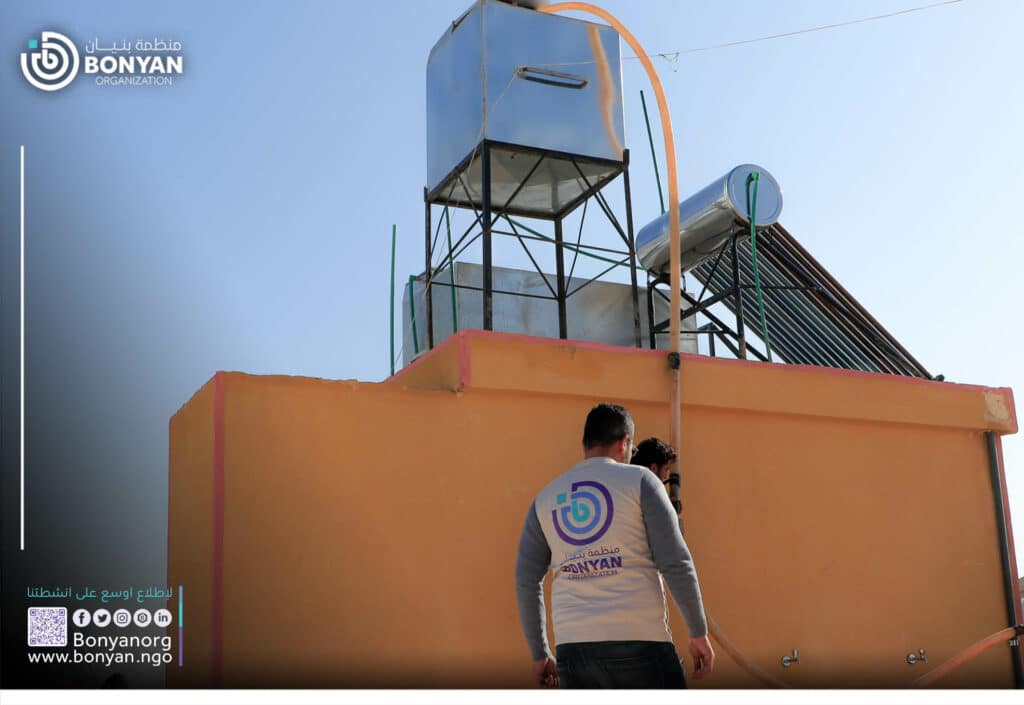Thousands of disabled refugees have no access to WASH facilities, let alone assistive devices to facilitate their access to sanitation services.
In the following article, we highlight the needs of disabled refugees, whereby they can access WASH services easily and comfortably.
Physical Accessibility
Ensuring the physical accessibility of WASH facilities is an integral part of this key project to ease the lives of disabled refugees.
This can be guaranteed through the following steps:
- Ensuring the services are properly equipped to assist those with disabilities, by installing handrails, ramps, and widened doorways, for example.
- Providing transportation to WASH services for those who cannot access them independently.
- Providing training for staff on how to provide WASH services to refugees with disabilities.
- Developing a system for reevaluating the accessibility of WASH facilities for disabled refugees.
- Holding awareness campaigns to educate refugees on the importance of WASH services.
- Advocating for the importance of improved access to WASH services for disabled refugees.
Availability of Assistive Devices
The availability of assistive devices in WASH services is certainly one of the basic rights of refugees with disabilities.
Below are some steps that could be applied to improve the accessibility of assistive devices for people with disabilities in WASH services:
- Engaging with refugee communities, local and international organizations, and governments to raise awareness about the importance of WASH services and the availability of the necessary assistive devices.
- Working with global organizations to ensure access to assistive devices for disabled refugees.
- Advocating for refugee-specific regulations that require the provision of assistive devices for disabled refugees in WASH services.
- Partnering with companies specializing in disability-related products to provide assistive devices to refugees with disabilities.
- Holding awareness campaigns and workshops to educate the public on the need for assistive devices for disabled refugees.
- Creating a referral system for disabled refugees to access assistive devices in WASH services.
- Providing financial assistance to disabled refugees to purchase assistive devices, such as wheelchairs, hearing aids, and communication devices.
Inclusive Participation and Decision-making
Involving refugees with disabilities in the decision-making process is indeed a key step in the development of WASH services designed for them.
To ensure the inclusiveness of disabled refugees in decision-making, below are some effective guidelines:
- Providing accessible communication channels and ensuring that information about WASH services is available in formats easily understood by disabled refugees.
- Ensuring disabled refugees have access to the same resources as other refugees when participating in decision-making.
- Ensuring all meetings and decision-making sessions are held in accessible locations for refugees with disabilities.
- Creating a safe and inclusive environment for disabled refugees to share their opinions, concerns, and experiences.
- Providing specific training and guidance to decision-makers on ensuring the effective engagement of disabled refugees.
- Incorporating the views of disabled refugees in the design and implementation of WASH services.
Training and Capacity Building
Providing aid workers with training to apply WASH services for refugees with disabilities is crucial because they must be equipped with the skills, knowledge, and understanding to provide tailored assistance to those with disabilities.
This training helps to ensure that aid workers can provide the necessary support to refugees with disabilities in a respectful and dignified manner.
Similarly, such training ensures that their rights and needs are met.
Additionally, training aid workers on the application of WASH services for refugees with disabilities also help to ensure that this category is not overlooked or forgotten in providing aid and services in refugee settings.

Safety and Dignity
We can ensure the dignity and safety of disabled refugees by using WASH services through the following steps:
- Ensuring their access to hygiene materials and services, like soap, towels, and sanitary pads
- Offering them training and support in using WASH services and materials.
- Providing them with psychological support.
- Advocating for their rights to access WASH services in a safe and dignified manner.
At Bonyan Organization, we are working on bringing water to thousands of families in the Northern Syria refugee camps.
Support our “ Provide Clean Water to Syrian Camps” campaign and help bring water to refugee families to meet their needs for drinking and cooking as well as hygiene and sanitation.
You can send your donations at the below link:
Resources
FAQs
What is humanitarian WASH?
WASH stands for water, sanitation, and hygiene.
What do we mean by including persons with disabilities in humanitarian action?
Including persons with disabilities in humanitarian action mean providing them with accessible and appropriate services and ensuring that they can participate in decision-making.
What are examples of WASH activities?
Examples of WASH activities include:
Providing access to safe drinking water.
Establishing or improving sanitation facilities.
Promoting good hygiene practices
What is the purpose of the WASH program?
The purpose of the WASH program works on:
Improving health.
Reducing poverty.
Improving socio-economic development.
Responding to global emergencies and outbreaks of life-threatening illnesses.



